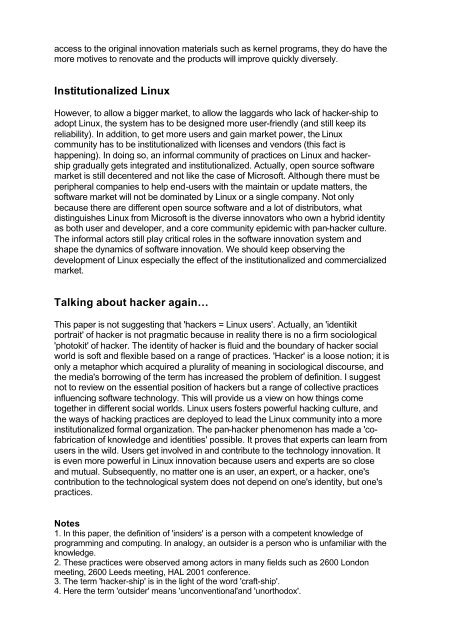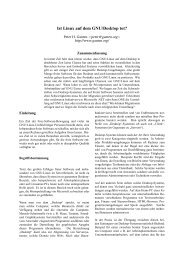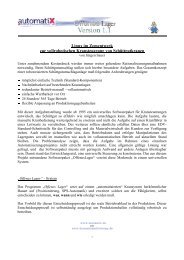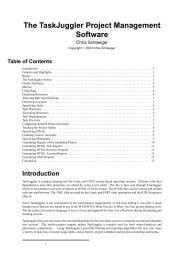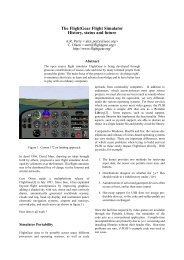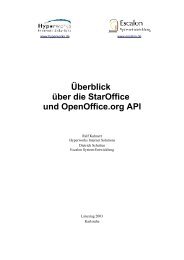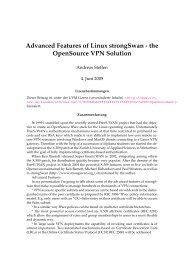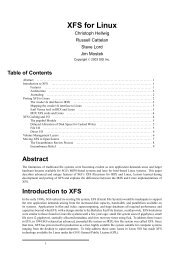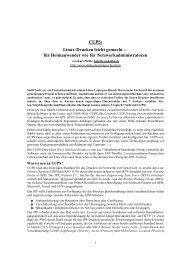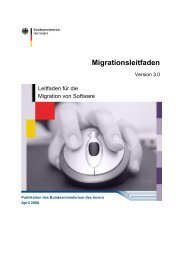Pan-hacker culture and unconventional software innovation ...
Pan-hacker culture and unconventional software innovation ...
Pan-hacker culture and unconventional software innovation ...
Create successful ePaper yourself
Turn your PDF publications into a flip-book with our unique Google optimized e-Paper software.
access to the original <strong>innovation</strong> materials such as kernel programs, they do have the<br />
more motives to renovate <strong>and</strong> the products will improve quickly diversely.<br />
Institutionalized Linux<br />
However, to allow a bigger market, to allow the laggards who lack of <strong>hacker</strong>-ship to<br />
adopt Linux, the system has to be designed more user-friendly (<strong>and</strong> still keep its<br />
reliability). In addition, to get more users <strong>and</strong> gain market power, the Linux<br />
community has to be institutionalized with licenses <strong>and</strong> vendors (this fact is<br />
happening). In doing so, an informal community of practices on Linux <strong>and</strong> <strong>hacker</strong>ship<br />
gradually gets integrated <strong>and</strong> institutionalized. Actually, open source <strong>software</strong><br />
market is still decentered <strong>and</strong> not like the case of Microsoft. Although there must be<br />
peripheral companies to help end-users with the maintain or update matters, the<br />
<strong>software</strong> market will not be dominated by Linux or a single company. Not only<br />
because there are different open source <strong>software</strong> <strong>and</strong> a lot of distributors, what<br />
distinguishes Linux from Microsoft is the diverse innovators who own a hybrid identity<br />
as both user <strong>and</strong> developer, <strong>and</strong> a core community epidemic with pan-<strong>hacker</strong> <strong>culture</strong>.<br />
The informal actors still play critical roles in the <strong>software</strong> <strong>innovation</strong> system <strong>and</strong><br />
shape the dynamics of <strong>software</strong> <strong>innovation</strong>. We should keep observing the<br />
development of Linux especially the effect of the institutionalized <strong>and</strong> commercialized<br />
market.<br />
Talking about <strong>hacker</strong> again…<br />
This paper is not suggesting that '<strong>hacker</strong>s = Linux users'. Actually, an 'identikit<br />
portrait' of <strong>hacker</strong> is not pragmatic because in reality there is no a firm sociological<br />
'photokit' of <strong>hacker</strong>. The identity of <strong>hacker</strong> is fluid <strong>and</strong> the boundary of <strong>hacker</strong> social<br />
world is soft <strong>and</strong> flexible based on a range of practices. 'Hacker' is a loose notion; it is<br />
only a metaphor which acquired a plurality of meaning in sociological discourse, <strong>and</strong><br />
the media's borrowing of the term has increased the problem of definition. I suggest<br />
not to review on the essential position of <strong>hacker</strong>s but a range of collective practices<br />
influencing <strong>software</strong> technology. This will provide us a view on how things come<br />
together in different social worlds. Linux users fosters powerful hacking <strong>culture</strong>, <strong>and</strong><br />
the ways of hacking practices are deployed to lead the Linux community into a more<br />
institutionalized formal organization. The pan-<strong>hacker</strong> phenomenon has made a 'cofabrication<br />
of knowledge <strong>and</strong> identities' possible. It proves that experts can learn from<br />
users in the wild. Users get involved in <strong>and</strong> contribute to the technology <strong>innovation</strong>. It<br />
is even more powerful in Linux <strong>innovation</strong> because users <strong>and</strong> experts are so close<br />
<strong>and</strong> mutual. Subsequently, no matter one is an user, an expert, or a <strong>hacker</strong>, one's<br />
contribution to the technological system does not depend on one's identity, but one's<br />
practices.<br />
Notes<br />
1. In this paper, the definition of 'insiders' is a person with a competent knowledge of<br />
programming <strong>and</strong> computing. In analogy, an outsider is a person who is unfamiliar with the<br />
knowledge.<br />
2. These practices were observed among actors in many fields such as 2600 London<br />
meeting, 2600 Leeds meeting, HAL 2001 conference.<br />
3. The term '<strong>hacker</strong>-ship' is in the light of the word 'craft-ship'.<br />
4. Here the term 'outsider' means '<strong>unconventional</strong>'<strong>and</strong> 'unorthodox'.


